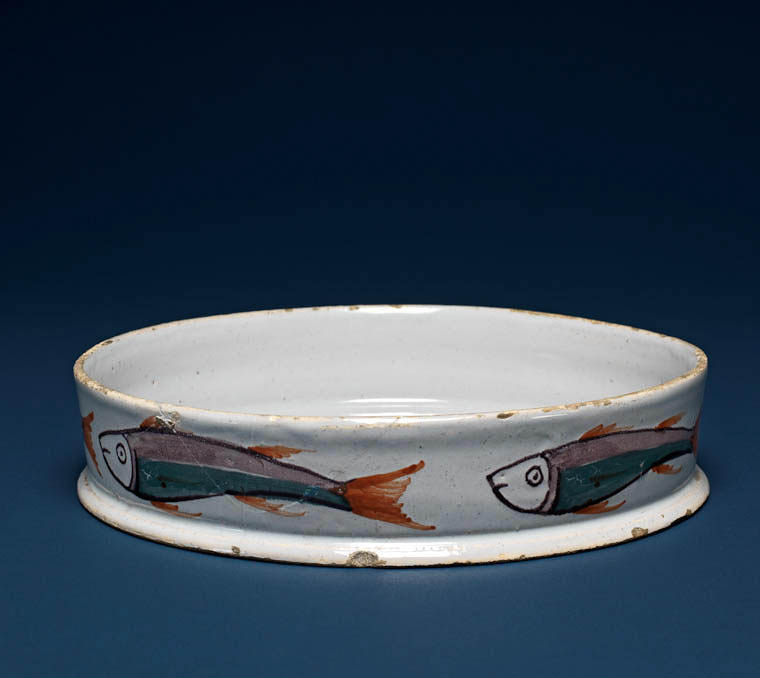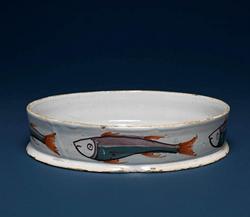Current Location: Gallery 27 (Glaisher)
Maker(s)
Production:
Old Haymarket Pottery
(Probably)
Proprietor of pottery:
Barnes, Zachariah
Entities
Categories
Description
Tin-glazed earthenware char dish, painted in polychrome with five fish on the exterior.
Earthenware with pale greyish-blue tin-glaze, painted in dark bluish-green, pale and dark manganese, and orange. Circular with straight sides and a slightly projecting base. Decorated on the exterior with five fish swimming to the left.
Notes
History note: Passed down in the family of the donor, DrJane Bidder, Cambridge
Legal notes
Given by Dr Jane Bidder
Measurements and weight
Diameter: 20.5 cm
Height: 4.2 cm
Acquisition and important dates
Method of acquisition: Given
(1993-06-19)
by
Bidder, Jane, Dr
Dating
18th Century, second half
George III
Circa
1760
CE
-
1780
CE
Note
The preservation of food to be eaten in the near future, or later in the year when it was out of season, was a very important part of a housewife's duties in the 17th and 18th centuries. It was also necessary to preserve food to be transported elsewhere for sale, for example, delicacies being sent to market in London. One way of preserving meat, eels, fish and shelfish was by potting them. This involved cooking them in a pot or dish, and after they had cooled, transfering them to a clean dish, and covering them with melted butter which hardened and prevented air from reaching the contents.
Shallow delftware dishes decorated with fish were used for potted char, a popular delicacy in the 18th century. This fish, whose full name is the arctic char (Salvelinus alpinus), is related to the salmon, and in England is only found in deep land-locked lakes, notably Lake Windermere in Cumbria. Recipes for potted char appeared in several of the best-known 18th century cookery books, such as Elizabeth Moxon's 'English Housewifery exemplified in about Four Hundred and Fifty Receipts' (c. 1741 and ten editions by 1769). Fragments of char dishes have been found on the site of the Lancaster delftware pottery, as well as in Liverpool, where Zacchariah Barnes of the Old Haymarketpottery is said to have specialized in making char dishes to send to the Lake District. Char dishs were also made in creamware (see C.18-1993).
Components of the work
Decoration
composed of
high-temperature colours
( in dark bluish-green, pale and dark manganese, and orange)
Materials used in production
bluish-white
Tin-glaze
Earthenware
Techniques used in production
Tin-glazing
: Earthenware with pale greyish-blue tin-glaze, painted in dark bluish-green, pale and dark manganese, and orange.
References and bibliographic entries
Identification numbers
Accession number: C.17-1993
Primary reference Number: 72518
Stable URI
Audit data
Created: Saturday 6 August 2011
Updated: Tuesday 31 December 2024
Last processed: Wednesday 14 May 2025
Associated departments & institutions
Owner or interested party:
The Fitzwilliam Museum
Associated department:
Applied Arts





